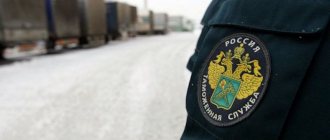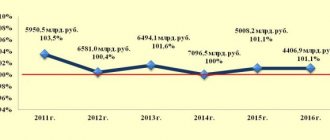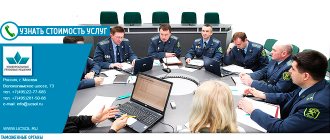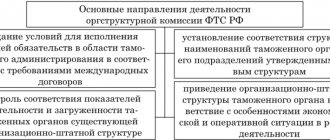Functions and tasks of customs authorities
Customs affairs are directly carried out by customs authorities, which constitute a single centralized state system. In Russia it is compiled:
- Federal Customs Service;
- regional customs department;
- customs;
- customs posts.
The content of customs affairs was determined by its tasks and functions.
Note 1
Functions are the main goals of the customs system established by the public-state function of protecting national interests, and tasks are a set of problems, the resolution of which leads to the implementation of the functionality.
Customs authorities perform a set of mutually related functions, such as regulatory, control, economic, information and analytical; they carry out operational, managerial, legal, economic, and support activities; solve various problems.
Are you an expert in this subject area? We invite you to become the author of the Directory Working Conditions
Among the functions of customs authorities, the main place in countries with developing market economies is occupied by the economic function. Among the types of activities, namely operational, managerial, legal, economic, support, economic activity seems to be one of the main ones. A large part of the tasks of the customs service is also associated with the implementation of the economic function and activities of economic specificity. These tasks must be considered economic, since their resolution leads to an increase in the rate of development of the national economy, improvement of its structure, the establishment of a civilized market, growth of the state budget, and ensuring the economic security of the state. In addition, the resolution of such problems may require the expenditure of production resources and be assessed by economic indicators, such as savings or overspending of allocated funds from the federal budget.
Note 2
Thus, the task of the customs authorities seems to be the implementation of customs clearance and customs control, the creation of conditions that contribute to an increase in the rate of trade turnover across the customs border.
Finished works on a similar topic
Course work Tasks, functions and rights of customs authorities 470 ₽ Abstract Tasks, functions and rights of customs authorities 220 ₽ Test work Tasks, functions and rights of customs authorities 210 ₽
Receive completed work or specialist advice on your educational project Find out the cost
Customs authorities collect customs duties, fees, taxes, special, anti-dumping and countervailing duties, monitor the correctness of calculation and timely payment of these taxes, duties and fees, and can take measures to collect them in a compulsory manner.
The tasks of customs authorities include ensuring compliance with order when moving vehicles and goods across customs borders. Their task is to ensure compliance with the restrictions and prohibitions established in accordance with the legislation of the Russian Federation on state regulation of foreign trade activities and international treaties of the Russian Federation in relation to goods that move across the customs border.
Customs authorities are engaged in ensuring, within the boundaries of their own competence, the protection of rights to intellectual property.
They fight against offenses in the field of customs affairs, implement preventive measures against illegal trafficking across the customs border of weapons, drugs, radioactive substances, cultural values, endangered plant and animal species, intellectual property, other goods, as well as assist in the fight against international terrorism and suppression of illegal interference at Russian Federation airports in the activities of international civil aviation.
Customs authorities implement, within the boundaries of their own competence, currency control of operations that are associated with the movement of vehicles and goods across the customs border, in accordance with the legislation of the Russian Federation on currency regulation and currency control.
Responsibilities of customs authorities
When performing their official duties, customs officials have obligations to:
- respect for the rights and legitimate interests of citizens, participants (foreign trade activities) who carry out activities in the field of customs;
- maintaining the level of qualifications necessary to perform job duties;
- performance of other duties established by the official regulations in order to perform the functions assigned to the customs authorities.
Chapter 46. Rights and obligations of customs authorities
Article 258. Responsibilities of customs authorities
Customs authorities are obliged to: 1) comply with international treaties and acts in the field of customs regulation, the legislation of the Russian Federation on customs regulation; 2) exercise control and supervision over compliance with international treaties and acts in the field of customs regulation, the legislation of the Russian Federation on customs regulation; 3) be guided by written explanations of the federal executive body, which carries out the functions of developing state policy and legal regulation in the field of customs affairs, on the application of the legislation of the Russian Federation on customs regulation; 4) ensure the fulfillment of the tasks and functions assigned to them by international treaties and acts in the field of customs regulation, the legislation of the Russian Federation on customs regulation, by exercising the powers determined by the Code of the Union, this Federal Law and other legislation of the Russian Federation.
Article 259. Rights of customs authorities
1. To perform the functions assigned to them, customs authorities have the following rights: 1) take measures provided for by international treaties and acts in the field of customs regulation, the legislation of the Russian Federation in the field of customs, as well as other legislation of the Russian Federation, control over compliance with which is entrusted to customs authorities, in order to ensure that persons comply with these acts; 2) require documents and information, including via telecommunication channels through a personal account, the presentation of which is provided for by international treaties and acts in the field of customs regulation, the legislation of the Russian Federation in the field of customs, as well as other legislation of the Russian Federation, control over compliance with which is entrusted to customs authorities, in order to ensure that persons comply with these acts; 3) require persons to confirm their authority to carry out certain activities in the field of customs affairs or perform certain actions; 4) use, in urgent cases, means of communication or vehicles belonging to organizations or public associations (except for means of communication and vehicles of diplomatic missions, consular and other institutions of foreign states, as well as international organizations), to prevent crimes, preliminary investigation of criminal cases in which criminal procedural legislation falls within the competence of customs authorities, for the prosecution and detention of persons who have committed such crimes or are suspected of committing them. Property damage incurred in such cases by the owners of communication means or vehicles shall be compensated by the customs authorities at the request of the owners of communication means or vehicles at the expense of the federal budget in the manner determined by the Government of the Russian Federation; 5) detain and deliver to the office premises of the customs authority or to the internal affairs bodies of the Russian Federation persons suspected of committing crimes, who have committed or are committing crimes or administrative offenses in the field of customs affairs, in accordance with the legislation of the Russian Federation; 6) use in their activities information systems, video and audio equipment, film and photographic equipment, as well as other technical and special means that do not cause harm to the life and health of citizens, the environment, form, maintain and use data banks about persons, goods ( subjects) and facts; 7) exchange information available to customs authorities in accordance with international treaties and acts in the field of customs regulation, as well as in accordance with this Federal Law with customs authorities of foreign states on customs matters; carry out, within the limits of their competence, information interaction with government bodies, other bodies and organizations; 9) develop, create and operate information systems, communication systems and data transmission systems, technical means of customs control, as well as means of protecting information, including means of cryptographic information protection, in accordance with the legislation of the Russian Federation; 10) submit claims and applications to courts or arbitration courts: a) for the collection of customs duties, taxes, special, anti-dumping, countervailing duties, customs duties, interest and penalties and other payments, the collection of which is entrusted to the customs authorities; b) on foreclosure of goods for payment of customs duties, taxes, special, anti-dumping, countervailing duties, customs duties; c) on recognition of property as ownerless; d) on the liquidation of organizations of any organizational and legal form on the grounds established by the legislation of the Russian Federation; e) on recognizing transactions as invalid and applying the consequences of their invalidity; f) in other cases provided for by international treaties and acts in the field of customs regulation, as well as the legislation of the Russian Federation on customs regulation; 11) freely, upon presentation of an official identification card, visit in connection with criminal cases under investigation and pending cases of administrative offenses, in connection with the verification of duly registered materials, messages and statements about crimes, as well as materials, messages and statements containing data, indicating the presence of an administrative offense, the consideration of which falls within the competence of customs authorities, state and municipal authorities, public associations and organizations, familiarize themselves with the necessary documents and materials, including personal data of citizens related to the investigation of criminal cases, proceedings in cases of administrative offenses, verification of materials, messages and statements about crimes, as well as materials, messages, statements containing data indicating the presence of an administrative offense event; 12) conduct research and development activities in the field of customs affairs; 13) exercise other rights provided for by this Federal Law and other federal laws; 14) bring persons to administrative responsibility in accordance with the legislation of the Russian Federation on administrative offenses. 2. The rights of customs authorities provided for in Part 1 of this article may be used exclusively in the implementation of tasks and functions assigned to customs authorities.
2) require documents and information, including via telecommunication channels through a personal account, the presentation of which is provided for by international treaties and acts in the field of customs regulation, the legislation of the Russian Federation in the field of customs, as well as other legislation of the Russian Federation, control over compliance with which is entrusted to customs authorities, in order to ensure that persons comply with these acts; 3) require persons to confirm their authority to carry out certain activities in the field of customs affairs or perform certain actions; 4) use, in urgent cases, means of communication or vehicles belonging to organizations or public associations (except for means of communication and vehicles of diplomatic missions, consular and other institutions of foreign states, as well as international organizations), to prevent crimes, preliminary investigation of criminal cases in which criminal procedural legislation falls within the competence of customs authorities, for the prosecution and detention of persons who have committed such crimes or are suspected of committing them. Property damage incurred in such cases by the owners of communication means or vehicles shall be compensated by the customs authorities at the request of the owners of communication means or vehicles at the expense of the federal budget in the manner determined by the Government of the Russian Federation; 5) detain and deliver to the office premises of the customs authority or to the internal affairs bodies of the Russian Federation persons suspected of committing crimes, who have committed or are committing crimes or administrative offenses in the field of customs affairs, in accordance with the legislation of the Russian Federation; 6) use in their activities information systems, video and audio equipment, film and photographic equipment, as well as other technical and special means that do not cause harm to the life and health of citizens, the environment, form, maintain and use data banks about persons, goods ( subjects) and facts; 7) exchange information available to customs authorities in accordance with international treaties and acts in the field of customs regulation, as well as in accordance with this Federal Law with customs authorities of foreign states on customs matters; carry out, within the limits of their competence, information interaction with government bodies, other bodies and organizations; 9) develop, create and operate information systems, communication systems and data transmission systems, technical means of customs control, as well as means of protecting information, including means of cryptographic information protection, in accordance with the legislation of the Russian Federation; 10) submit claims and applications to courts or arbitration courts: a) for the collection of customs duties, taxes, special, anti-dumping, countervailing duties, customs duties, interest and penalties and other payments, the collection of which is entrusted to the customs authorities; b) on foreclosure of goods for payment of customs duties, taxes, special, anti-dumping, countervailing duties, customs duties; c) on recognition of property as ownerless; d) on the liquidation of organizations of any organizational and legal form on the grounds established by the legislation of the Russian Federation; e) on recognizing transactions as invalid and applying the consequences of their invalidity; f) in other cases provided for by international treaties and acts in the field of customs regulation, as well as the legislation of the Russian Federation on customs regulation; 11) freely, upon presentation of an official identification card, visit in connection with criminal cases under investigation and pending cases of administrative offenses, in connection with the verification of duly registered materials, messages and statements about crimes, as well as materials, messages and statements containing data, indicating the presence of an administrative offense, the consideration of which falls within the competence of customs authorities, state and municipal authorities, public associations and organizations, familiarize themselves with the necessary documents and materials, including personal data of citizens related to the investigation of criminal cases, proceedings in cases of administrative offenses, verification of materials, messages and statements about crimes, as well as materials, messages, statements containing data indicating the presence of an administrative offense event; 12) conduct research and development activities in the field of customs affairs; 13) exercise other rights provided for by this Federal Law and other federal laws; 14) bring persons to administrative responsibility in accordance with the legislation of the Russian Federation on administrative offenses. 2. The rights of customs authorities provided for in Part 1 of this article may be used exclusively in the implementation of tasks and functions assigned to customs authorities.
Article 260. Rights of customs authorities when carrying out customs control using watercraft and aircraft of customs authorities
1. When carrying out customs control using watercraft and aircraft of customs authorities, these authorities have the right to: 1) if they detect signs that goods subject to customs control are being illegally transported on a vehicle, stop such a vehicle and conduct a customs inspection of it; 2) to detain persons on a vehicle suspected of committing crimes, the production of urgent investigative actions and inquiries for which is assigned by the criminal procedural legislation of the Russian Federation to the jurisdiction of customs authorities, unless otherwise provided by international treaties of the Russian Federation; 3) to pursue and detain, outside the territorial sea of the Russian Federation, water vessels that have departed from the territory of the Russian Federation without the permission of customs authorities, in the contiguous zone of the Russian Federation until they enter the territorial sea of a foreign state, if the pursuit was started in internal waters, in the territorial sea of the Russian Federation Federation after giving a visual or audible signal to stop from a distance allowing this signal to be seen or heard, and was carried out continuously; 4) if signs of an administrative offense in the field of customs are detected, detain vehicles for their subsequent seizure or arrest in accordance with the legislation of the Russian Federation on administrative offenses; 5) in cases provided for by the Code of the Union and this Federal Law, escort vehicles, including placing customs officials on them. 2. The crews of watercraft and aircraft of customs authorities are granted the right to: 1) free use of the water and air space of the Russian Federation, water areas of sea and river ports, their berths and other water berthing structures, as well as airports, airfields (landing areas) on the territory of the Russian Federation regardless of their affiliation and purpose; 2) free use of the priority right to enter and exit the port in the manner agreed upon with the authorized federal executive authorities; 3) free receipt of navigation, hydrometeorological, hydrographic and other information; 4) free provision of flights and navigation.
Article 261. Rights of customs authorities to stop vehicles
1. Customs authorities have the right to stop motor vehicles, including those not carrying out international transportation of goods, in order to verify compliance with international treaties and acts in the field of customs regulation and the legislation of the Russian Federation by checking goods and documents for them. 2. Customs authorities may independently stop motor vehicles specified in part 1 of this article in customs control zones created along the State Border of the Russian Federation, and if the curb weight of the specified vehicle is three and a half tons or more, in the zones customs control established along the State border of the Russian Federation, as well as in the territories of the Altai Republic, the Republic of Dagestan, the Republic of Ingushetia, the Kabardino-Balkarian Republic, the Karachay-Cherkess Republic, the Republic of North Ossetia-Alania, the Chechen Republic, the Altai Territory, the Stavropol Territory, the Astrakhan Region , Bryansk region, Volgograd region, Kurgan region, Leningrad region, Novosibirsk region, Omsk region, Orenburg region, Pskov region, Samara region, Saratov region, Smolensk region, Tver region, Tyumen region, Chelyabinsk region and the federal city of St. Petersburg. 3. In places not provided for by Part 2 of this article, the stopping of motor vehicles specified in Part 1 of this article is carried out by internal affairs bodies authorized in the field of ensuring road safety, in cooperation with customs authorities. 4. Stopping a motor vehicle in accordance with Part 2 of this article is carried out at the request of an authorized official of the customs authority, and in the case provided for by Part 3 of this article, at the request of an authorized official of the internal affairs bodies. 5. A person driving a motor vehicle specified in part 1 of this article is obliged, at the request of the authorized officials specified in part 4 of this article, to stop the motor vehicle and present the said vehicle, the goods and documents for them to the authorized official to the person of the customs authority to carry out customs control. 6. If motor vehicles are stopped outside customs control zones, the time for customs authorities to check goods and documents for them and record the results of the check cannot exceed two hours. Forced placement of the specified vehicles in the territory of a temporary storage warehouse or in another place that is a permanent customs control zone is permitted when a decision is made to conduct a customs inspection, as well as in the event of initiation of a case of an administrative offense with the delivery of a copy of the relevant decision or protocol to the carrier or person the operator of the vehicle. In this case, such a vehicle may be located on the territory of a temporary storage warehouse or in another place that is a permanent customs control zone for the time necessary for its unloading, except if such a vehicle is subject to seizure or arrest in accordance with the legislation of the Russian Federation about administrative offenses or in accordance with the criminal procedural legislation of the Russian Federation. 7. A report on stopping a motor vehicle is drawn up, one copy of which must be handed over to the carrier. The form of such an act and the procedure for filling it out are established by the federal executive body exercising control and supervision functions in the field of customs affairs. 8. Delivery to the carrier (person driving a motor vehicle) of the act provided for in Part 7 of this article indicates the completion of customs control in the form of verification of customs and other documents and (or) information. The said act reflects the results of verification of customs and other documents and (or) information. 9. Based on the results of customs control in relation to goods provided for in Part 1 of this article, acts provided for in Articles 327 and (or) 328 of the Union Code are drawn up.
Article 262. Obligation to fulfill the requirements of customs authorities and their officials
1. The legal requirements of customs authorities and their officials in the performance of their official duties are mandatory for all persons. 2. Failure to comply with the legal requirements of customs authorities and their officials and the commission of actions (inaction) that prevent them from fulfilling their official duties entail liability established by the legislation of the Russian Federation.
Article 263. Departmental control
1. Unless otherwise provided by this Federal Law and other federal laws, a higher customs authority, if there are reasons, has the right to conduct departmental control of decisions, actions (inaction) of a lower customs authority. If, based on the results of departmental control, a decision of a lower customs authority is identified that does not comply with the requirements of international treaties and acts in the field of customs regulation, the legislation of the Russian Federation on customs regulation, the higher customs authority is obliged to cancel such a decision in whole or in part, except for cases where violations were committed when making the decision the lower customs authority cannot be eliminated or the period for making a new decision has expired. 2. If, after cancellation (partial cancellation) in the order of departmental control of a decision of a lower customs authority, a new decision is required, such a decision is made by the customs authority based on the results of customs control in accordance with international treaties and acts in the field of customs regulation, the legislation of the Russian Federation on customs regulation within thirty calendar days from the date of receipt of the results of the said customs control, provided that a different period is not provided for by international treaties and acts in the field of customs regulation, as well as this Federal Law. 3. The federal executive body, which carries out the functions of developing state policy and legal regulation in the field of customs, determines the procedure for conducting departmental control of decisions, actions (inaction), as well as the form of the decision made based on the results of departmental control. 4. Departmental control is carried out by customs authorities in connection with the presence of reasons. Reasons for conducting departmental control include: 1) statements of claim (statements) of citizens and organizations, rulings, and other documents of judicial authorities received by the customs authorities in connection with appealing decisions, actions (inaction) of customs authorities and their officials; 2) appeals of citizens and organizations to customs authorities; 3) appeals received by customs authorities from state bodies, prosecutors and other bodies; 4) appeals received by the customs authorities from the office of the Commissioner under the President of the Russian Federation for the protection of the rights of entrepreneurs, as well as from the offices of the commissioners for the protection of the rights of entrepreneurs in the constituent entities of the Russian Federation; 5) reasons arising in connection with the implementation by customs authorities or officials of customs authorities of their tasks and functions, including during: a) carrying out customs control and (or) implementing decisions based on the results of customs inspections; b) conducting service, comprehensive, functional and targeted inspections; c) proceedings in criminal cases, cases of administrative offenses; d) provision of public services for maintaining registers of persons carrying out activities in the field of customs; e) monitoring and analysis of databases and information resources of the Unified Automated Information System of customs authorities; f) there is an objection to the customs inspection report. 5. The federal executive body exercising the functions of developing state policy and legal regulation in the field of customs affairs has the right to determine other reasons for conducting departmental control.
Article 264. Consultation by customs authorities, the procedure for making certain preliminary decisions by customs authorities
1. Customs authorities provide consultations to persons on customs matters and other issues within the competence of customs authorities. The head of the customs authority (the person replacing him) determines the officials of the customs authority authorized to conduct consultations. 2. Consultation by customs authorities is provided free of charge in oral, written and electronic forms. Upon written and electronic request of a person, the customs authority is obliged to provide information as soon as possible, but no later than one month from the date of receipt of the specified request. (the provisions of Part 2 on the electronic form of consultation apply from January 1, 2021, see Article 398 of this Law) 3. Information provided to persons during consultation is not the basis for making a decision or taking actions (inaction) by the customs authority or its official person when performing customs operations in relation to goods. 4. If the requested information was provided untimely or in an unreliable form, which led to losses for the person seeking advice, compensation for losses is carried out in accordance with the legislation of the Russian Federation. 5. The procedure and timing of consultation by customs authorities are determined by the federal executive body exercising the functions of developing state policy and legal regulation in the field of customs affairs. 6. Customs authorities make preliminary decisions on the classification and origin of goods, on the application of methods for determining the customs value of imported goods, as well as on other issues determined by the Commission. 7. The federal executive body, which carries out the functions of developing state policy and legal regulation in the field of customs, establishes the procedure for making preliminary decisions on issues determined by the Commission, if such a procedure is not determined by the Commission.
Article 265. Obtaining information about the reasons for a decision made, an action taken (inaction)
1. A person in respect of whom a decision has been made or an action taken by a customs authority or its official, as well as a person in respect of whom a decision has not been made or an action to be taken has not been performed within the established period, has the right to submit a request to this customs authority about the reasons and about the grounds for the decision made or the action taken, or about the reasons for not making a decision or inaction, if this affects the rights and legitimate interests of these persons directly and individually. 2. The request must be submitted within six months from the date of the decision, the commission of an action (inaction) or the expiration of the period for their adoption or commission, or from the day when the person became aware of the decision made or the action (inaction) taken. 3. An interested person may make a request to provide the necessary information either orally or in writing. An oral request is subject to consideration by the customs authority on the day it is received. When submitting a written request, the response must be given in writing within ten days from the date of receipt.
Article 266. Assessment of the work of customs authorities
1. The main criteria for assessing the work of customs authorities are: 1) the speed of customs operations when importing goods into the Russian Federation and exporting goods from the Russian Federation, as well as reducing the costs of interested parties when performing customs operations; 2) timeliness and completeness of receipt of customs payments; 3) the effectiveness of combating crimes and administrative offenses. 2. The federal executive body exercising the functions of developing state policy and legal regulation in the field of customs, including based on the main criteria for assessing the work of customs authorities specified in Part 1 of this article, determines a list of indicators for assessing the effectiveness of the activities of customs authorities, the procedure and methodology for their monitoring, the procedure for the participation in such monitoring of persons specified in Part 3 of Article 10 of this Federal Law, and also controls the implementation of indicators for assessing the effectiveness of the activities of customs authorities. 3. Information on the results of monitoring indicators for assessing the effectiveness of the activities of customs authorities is made available to the general public by posting on the official website of the federal executive body exercising control and supervision functions in the field of customs affairs, on the Internet and (or) in another way.






